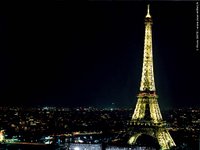
I was recently in France visiting Paris and Grenoble. Everyone I spoke to had weblogs, and I realized that this format would allow me to lay down some thoughts without structure or context (hence the title "sans contexte"), and not have it look like someone's term paper or whatever.
Since this is the first blog, and I haven't gathered much material yet, so there isn't much on this page. It will gather momentum, however (I hope).
While I was in Grenoble, the July 2004 issue of the French magazine Le Point printed an interview with Michel Foucault, "l'un des grands penseurs du XXe siecle (one of the great thinkers of the 20th century)." He referred to himself as a pyrotechnist and a geologist, one who investigates the seams and fault lines of a rock formation in order to determine where to put the charges that will bring the entire edifice down in one fell swoop. For Foucault, it was about power.
Several things stand out about Foucault. First, he died of AIDS on June 25, 1984. Much of his study and work stemmed from his own confusion about his sexuality, which led him to study sexuality, power, knowledge, prison reform, and insanity. The interesting fact is that you don't read too much about philosophers dying of AIDS. I guess that they are human as well.
The second thing is the definition of his role in the world. He refers to himself as the explosives expert that knows the geology of the social terrain, and how to read the various strata and where to place the explosive charge in order to do the maximum effect with the least amount of explosive. His role in society was to bring down the walls of society that not only marginalized people, but neatly tucked them away and hid them under a label so that they wouldn't have faces. As one philosopher put it, Foucault fought every form of exclusion and every form of oppression.
What strikes me about his self-defined role is that I've always thought that this is what Christians were supposed to do. When you look at the role Christians played in the first few centuries of the church's existence, they were the pyrotechnists who worked to bring down the barriers that society erected, which defined what reality was really about. But it seems that once poor Constantine got into power, he legitimized Christianity and made it a legal religion, it's been downhill ever since.
So, the Christians have to learn from the non-Christians. Which is part of why France intrigues me so. Religion does not have much influence in France, and Christianity even less so. You have a culture that has marginalized Christianity to the point that is has virtually no influence on daily life.
This leaves Christians with the task to find a way to live the gospel in french culture that is not laden with all the baggage that Christianity currently schleps with it, and has form and power in a biblical sense.
Part of the role for this weblog for me, at least, is to think through and discuss what all this means. Someday I hope to be in France and to live the gospel in their midst. But before I do that, I need to figure out what the french culture is about, and how I can live in this culture, know how it thinks, what their world views are, and their presuppositions and so on.
The other part of this task is to unpackage the church , and free it from the cultural wrappings that it lives in.
Thanks for listening.
17 July 2004
July 17
Subscribe to:
Post Comments (Atom)





0 comments:
Post a Comment